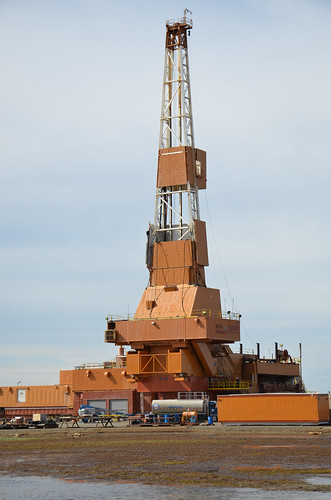 This paper here is an interesting (if somewhat technical) look at knowledge management in a remote and difficult business - drilling oil wells in the Alaskan Wilderness.
This paper here is an interesting (if somewhat technical) look at knowledge management in a remote and difficult business - drilling oil wells in the Alaskan Wilderness.In the drilling business, time is money, and knowledge management is routinely applied to improve drilling performance through finding more efficient ways to operate, and through learning to eliminate wasted time.
The Alaskan drill crews use a Knowledge Management framework to help improve drilling performance, including the following elements;
- Clear management expectations and support
- A Technical Limits workshop, to drive "Learning Before"
- A Technical Limits coach, with accountability for driving the learning and improvement process on the rig site
- Rigsite meetings to identify and discuss lessons learned
- A supporting lessons management system
- Collection of metrics on key performance indicators such as the lessons closed/pending ration.
This metric is described as follows;
 The pie chart to the right is a typical example of this metric, showing how 82%of the lessons identified at the rigsite have been "Closed" or "Completed" through embedding the learning into procedures.
The pie chart to the right is a typical example of this metric, showing how 82%of the lessons identified at the rigsite have been "Closed" or "Completed" through embedding the learning into procedures.
The outcome, for the drilling teams, is continuously improved performance.
This is illustrated in the line-chart to the right, showing how the time for certain operations has been improved over a series of wells, through applying the learning framework described above.
The time to test the BOPE, for example, has been reduced from 17 to an average of 5 hours, and the time taken to mill a window has been reduced from 15 to 10 hours.
In a remote hostile environment, where time is money, a simple knowledge management framework is delivering step-out improvements in performance.
"Another important aspect is the gathering and processing of lessons. Closure of a lesson is generally defined as validation that a document, procedure, or rig-specific item has been changed. The Lessons Learned database maintains a good closed/pending ratio indicating a high level of activity and involvement moving lessons learned into rig operations."
 The pie chart to the right is a typical example of this metric, showing how 82%of the lessons identified at the rigsite have been "Closed" or "Completed" through embedding the learning into procedures.
The pie chart to the right is a typical example of this metric, showing how 82%of the lessons identified at the rigsite have been "Closed" or "Completed" through embedding the learning into procedures.The outcome, for the drilling teams, is continuously improved performance.
This is illustrated in the line-chart to the right, showing how the time for certain operations has been improved over a series of wells, through applying the learning framework described above.
The time to test the BOPE, for example, has been reduced from 17 to an average of 5 hours, and the time taken to mill a window has been reduced from 15 to 10 hours.
In a remote hostile environment, where time is money, a simple knowledge management framework is delivering step-out improvements in performance.




No comments:
Post a Comment